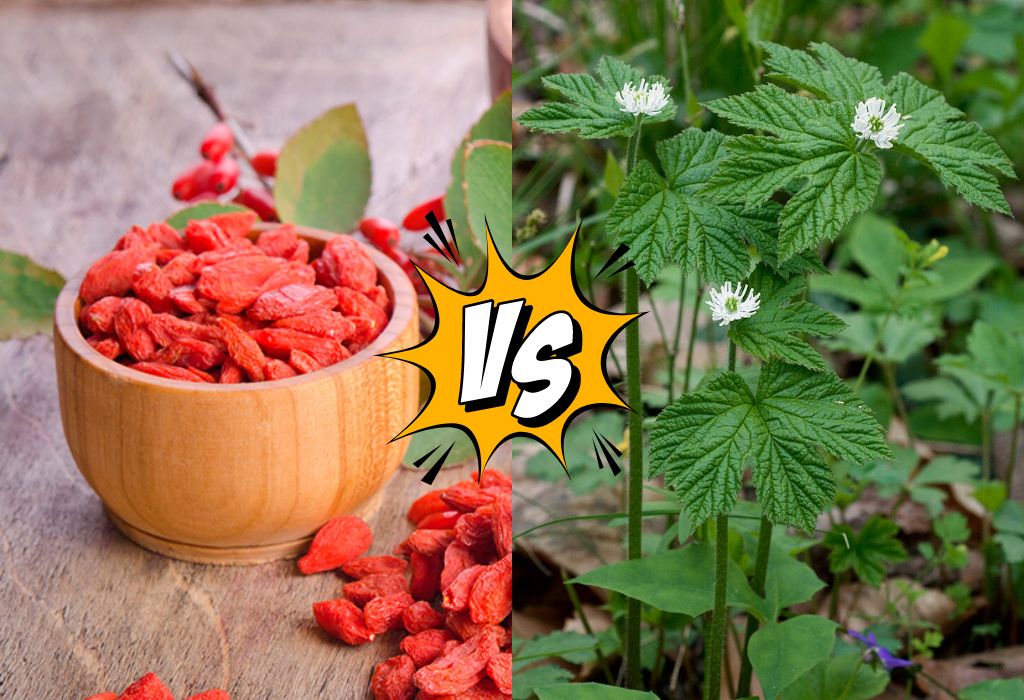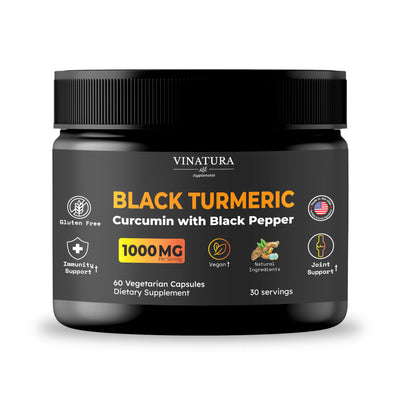
Berberine Vs Goldenseal: Which Should You Choose?
When searching for natural solutions to improve health, many people often wonder whether to choose berberine vs goldenseal. Both are valuable compounds derived from nature, known for their potential health benefits. However, Each has distinct characteristics and offers different wellness benefits. In this article, we will explore the benefits, similarities, and differences between berberine and goldenseal, helping you make an informed decision for your health.
Before exploring further, please read the disclaimer located at the end of this webpage.
Key Takeaways
- Berberine is primarily used to support healthy blood sugar levels, assist in weight management, and promote cardiovascular wellness.
- Goldenseal is commonly used to promote immune function, support digestive wellness, and provide overall health support.
- Berberine and Goldenseal are not the same, but Goldenseal contains about 0.5-0.6% of the berberine compound.
About Berberine

What Is Berberine?
Berberine is a characteristic yellow compound found in several natural plants such as barberry, goldenseal, Oregon grape, and California poppy. It is one of the prominent representatives of isoquinoline alkaloids and has been used as an antimicrobial agent in China since ancient times [1].
Berberine Benefits
Numerous studies have reported that berberine has a wide pharmacological activity spectrum, providing several health benefits such as:
- Blood Sugar Support: Berberine has been shown to support healthy blood sugar levels by promoting insulin sensitivity [2].
- Weight Management: Berberine has been shown to support glucose and lipid metabolism, assisting in healthy weight management [3].
- Cholesterol Improvement: In a study on mice, berberine was found to lower blood cholesterol levels by inhibiting intestinal absorption and interfering with the micellization process of cholesterol [4].
- Anti-Inflammatory Properties: Berberine has been shown to have anti-inflammatory properties, promoting overall digestive wellness [5].
- Hormonal Balance: Berberine may improve metabolic and hormonal disorders in women with polycystic ovary syndrome by regulating hormones such as progesterone, androgens, aromatase, and steroids [6].
About Goldenseal

What Is Goldenseal?
Goldenseal (Hydrastis canadensis L.) is a plant native to North America, used in various traditional medicine systems. It contains a primary active ingredient, the berberine alkaloid, which is also found in several traditional Asian medicinal plants [7].
Goldenseal Benefits
- Immune Support: Goldenseal has immune-modulating capabilities and potential in supporting macrophage immune responses [8].
- Antimicrobial Properties: Goldenseal has potential roles in antibacterial, antifungal, and antiviral activities, effectively combating many pathogens [9].
- Digestive Health: Goldenseal can aid conditions like stomach and digestive disorders, peptic ulcers, and colitis. Over time, it has become a traditional supplement for reducing digestive disorders, inflammatory bowel diseases, urinary disorders, and constipation [10].
- Blood Sugar Regulation: Some studies indicate that goldenseal may help regulate blood sugar levels, providing potential benefits for diabetics [11].
- Skin Health: Goldenseal is also considered beneficial for skin infections, eczema, and other dermatological issues due to its anti-inflammatory properties [12].
Berberine Vs Goldenseal: Which Should You Choose?

Berberine and Goldenseal are both popular options when looking for natural health solutions. However, each has unique characteristics and is suited for different health conditions.
Consider berberine for supporting blood sugar balance, metabolic health, and weight management. Berberine is known for its potent blood sugar-regulating capabilities, enhancing insulin sensitivity, lowering blood sugar, and reducing fat storage, particularly in the abdominal area. Additionally, if you are concerned about high cholesterol, berberine positively impacts blood lipid levels.
Consider goldenseal for immune and digestive support. The antibacterial and antifungal properties of goldenseal can effectively address these health concerns.
Comparison Table Of Berberine And Goldenseal
|
Factor |
Berberine |
Goldenseal |
|
Similarities |
||
|
Natural Compounds |
Both are natural compounds with potential health benefits. |
|
|
Anti-inflammatory Properties |
Known for anti-inflammatory properties, helping with various inflammatory conditions. |
|
|
Antimicrobial Properties |
Contains antibacterial and antifungal properties, effective against infections. |
|
|
Differences |
||
|
Botanical Sources |
Derived from plants like barberry, goldenseal, and tree turmeric. |
Sourced primarily from the goldenseal plant (Hydrastis canadensis). |
|
Primary Active Compounds |
Berberine |
Berberine and other alkaloids |
|
Traditional Uses |
Used in Traditional Chinese Medicine and Ayurveda for various conditions, especially metabolic issues. |
Traditionally used in North America medicine for digestive and immune support. |
|
Main Benefits |
Supports blood sugar regulation, weight management, and heart health. |
Aids immune function, digestive health, and skin issues. |
|
Potential Side Effects |
May cause gastrointestinal upset; caution advised with certain medications. |
Generally well-tolerated but can cause nausea; should be avoided in pregnancy. |
|
Interactions |
Can interact with certain medications (blood thinners, diabetes medications). |
May interact with prescription medications and should be used cautiously. |
Frequently Asked Questions
Are goldenseal and berberine the same thing?
No, goldenseal and berberine are not the same. Goldenseal is a plant known for its healing properties, while berberine is a bioactive compound found in several plants, including goldenseal, barberry, and Oregon grape.
What do berberine and goldenseal do?
Both berberine and goldenseal offer numerous health benefits. Berberine is primarily used to regulate blood sugar levels, support weight loss, and improve cardiovascular health. Goldenseal is commonly used to support immune function, digestive health, and provide antimicrobial effects.
How much berberine is in goldenseal?
The berberine content in goldenseal ranges from 0.5-0.6%. The amount of berberine can vary depending on the processing methods and the source of the plant. It is best to check the product label or consult a healthcare provider for specific dosage information.
Is goldenseal good for kidneys?
Goldenseal should not be used in cases of kidney disease, including renal failure, due to insufficient excretion of alkaloids. This herb should also be avoided in cases of liver disease or acute gastritis.
How much berberine should I take?
The standard dosage of berberine is 900-2,000 mg per day, divided into three to four doses, with a maximum of 500 mg per dose. It is recommended to take berberine with meals or shortly after eating to enhance its effectiveness in regulating blood sugar and lipid levels. Consult with a healthcare professional for personalized recommendations and safety.
Conclusion
In summary, when comparing berberine and goldenseal, each has its own distinct benefits and applications. If you are looking for a solution to support blood sugar regulation and metabolic health, berberine may be the better choice. Conversely, if you need a method to boost immunity and support digestion, goldenseal would be a reasonable option. Whichever you choose, remember to consult a healthcare professional to ensure safety and efficacy in your health care.
References
- [1] Kong, Yuan, et al. “A Patent Review of Berberine and Its Derivatives with Various Pharmacological Activities (2016–2020).” Expert Opinion on Therapeutic Patents, vol. 32, no. 2, 17 Sept. 2021, pp. 211–223, https://doi.org/10.1080/13543776.2021.1974001. Accessed 4 Dec. 2023.
- [2] Zhang, Hao, et al. “Berberine Lowers Blood Glucose in Type 2 Diabetes Mellitus Patients through Increasing Insulin Receptor Expression.” Metabolism, vol. 59, no. 2, Feb. 2010, pp. 285–292, https://doi.org/10.1016/j.metabol.2009.07.029.
- [3] Ilyas, Zahra, et al. “The Effect of Berberine on Weight Loss in Order to Prevent Obesity: A Systematic Review.” Biomedicine & Pharmacotherapy, vol. 127, July 2020, p. 110137, https://doi.org/10.1016/j.biopha.2020.110137.
- [4] Wang, Yanwen, et al. “Berberine Decreases Cholesterol Levels in Rats through Multiple Mechanisms, Including Inhibition of Cholesterol Absorption.” Metabolism, vol. 63, no. 9, Sept. 2014, pp. 1167–1177, https://doi.org/10.1016/j.metabol.2014.05.013.
- [5] Kuo, Chi-Li, et al. “The Anti-Inflammatory Potential of Berberine in Vitro and in Vivo.” Cancer Letters, vol. 203, no. 2, Jan. 2004, pp. 127–137, https://doi.org/10.1016/j.canlet.2003.09.002.
- [6] Rondanelli, Mariangela, et al. “Berberine Phospholipid Is an Effective Insulin Sensitizer and Improves Metabolic and Hormonal Disorders in Women with Polycystic Ovary Syndrome: A One-Group Pretest–Post-Test Explanatory Study.” Nutrients, vol. 13, no. 10, 19 Oct. 2021, p. 3665, https://doi.org/10.3390/nu13103665.
- [7] “Page Restricted.” Google.com.vn, 2024, books.google.com.vn/books?hl=en&lr=&id=r33SBQAAQBAJ&oi=fnd&pg=PA297&dq=What+Is+Goldenseal%3F&ots=1zT9iw3UlW&sig=HOy_7lyUV5GHO3wdlSFAAg-RU0M&redir_esc=y#v=onepage&q=What%20Is%20Goldenseal%3F&f=false. Accessed 12 Oct. 2024.
- [8] Clement-Kruzel, Stacia, et al. “Immune Modulation of Macrophage Pro-Inflammatory Response by Goldenseal and Astragalus Extracts.” Journal of Medicinal Food, vol. 11, no. 3, Sept. 2008, pp. 493–498, https://doi.org/10.1089/jmf.2008.0044.
- [9] EGAN,. “Antimicrobial Compounds from Endophytic Fungi of Goldenseal (Hydrastis Canadensis).” ProQuest, www.proquest.com/openview/3f2924623b2ecc757df66180d02e113f/1?pq-origsite=gscholar&cbl=18750. Accessed 12 Oct. 2024.
- [10] Mandal, Sudip Kumar, et al. “Goldenseal (Hydrastis Canadensis L.) and Its Active Constituents: A Critical Review of Their Efficacy and Toxicological Issues.” Pharmacological Research, vol. 160, Oct. 2020, p. 105085, https://doi.org/10.1016/j.phrs.2020.105085.
- [11] Kandunuri, Kiran Kumar. “The Effects of Herbal Extracts and Compounds on the Glucose Metabolism in Hep G2 Cells | London Met Repository.” Londonmet.ac.uk, Aug. 2023, repository.londonmet.ac.uk/9075/, https://repository.londonmet.ac.uk/9075/1/Kiran-Kumar-Kandunuri-PhD-Thesis.pdf. Accessed 12 Oct. 2024.
- [12] ---. “Goldenseal (Hydrastis Canadensis L.) and Its Active Constituents: A Critical Review of Their Efficacy and Toxicological Issues.” Pharmacological Research, vol. 160, Oct. 2020, p. 105085, https://doi.org/10.1016/j.phrs.2020.105085.
Author

Product Disclaimer
The dietary supplement products mentioned on this website are formulated based on scientific research and adhere to FDA guidelines for dietary supplements. However, the content of the articles has not been evaluated by the Food and Drug Administration (FDA) and is not intended to promote or endorse any specific product. Any products sold on this website are not intended to diagnose, treat, cure, or prevent any disease.
Opinions and Endorsements
Any claims, statements, or opinions expressed in the articles are those of the author(s) and do not necessarily reflect the views or opinions of the manufacturers of the dietary supplement products. The products sold on this website are separate from the content of the articles and are not directly endorsed or associated with the information presented here.
Liability Disclaimer
The author(s) of the articles, website, and manufacturers of the dietary supplement products do not assume any liability for any potential consequences arising from the use of the information provided in the articles. It is recommended that individuals consult with a qualified healthcare professional before making any dietary or lifestyle changes, including the use of dietary supplements.
Product Usage
Please refer to the product labels and packaging for specific usage instructions and guidelines for the dietary supplement products sold on this website.
Customer Support
For any concerns or questions regarding the dietary supplement products, please contact our customer support team, who will be more than happy to assist you.





Leave a Comment
Be the first to comment.
What do you think?